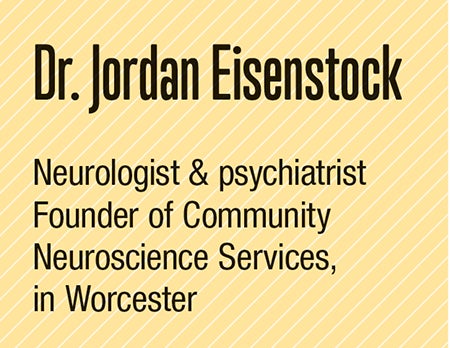Dr. Jordan Eisenstock is board-certified neurologist and psychiatrist and founder of Community Neuroscience Services in Worcester and Westborough. Inspired by healthcare reforms, Eisenstock wanted to create a patient-focused practice that looked at the whole picture of what a patient with neurological disorders faces daily. As a result, Community Neuroscience Services is not just composed of skilled neurologists, but also psychologists, psychiatrists, sleep medicine specialists, and other doctors in different disciplines.

As the founder of Community Neuroscience Services, what inspired you to create this practice?
I completed medical school in 2002, around the time Romneycare was being passed here in Massachusetts. It was not long after when Obamacare was adopted nationally. Within the medical community, it was clear at the time that healthcare reform was being received with mixed emotions, mostly combinations of fear, excitement, and anger. It was clear to me I had learned a lot about being a doctor while in training, but not very much about the operations, finances, or the general business of medicine. I enrolled in some management courses to become a certified physician executive, later completed an MBA, and participated in several hospital projects. Community Neuroscience Services was cultivated as an opportunity to start something brand new with the hope of getting as many of these reform-related priorities correct to ultimately benefit all of our patients, doctors, and staff.
What services do you offer?
CNS offers general neurology, general psychiatry, geriatric psychiatry, child psychology, adult and child neuropsychology, pediatric neurology, neuromodulation, and neuropsychiatry. The neurologists at CNS have training in multiple subspecialties, including neurophysiology, movement disorders, headache, and sleep medicine. CNS offers on-site diagnostics including EEG, EMG, psychometric testing, and home sleep studies, as well as on-site procedures including lumbar puncture, skin biopsy, botox, and nerve blocks.
How does CNS’s focus on holistic treatments benefit patients?
Patients benefit from the holistic care provided at CNS in multiple ways. Patients are more likely to complete recommended testing when travel and other logistics are simplified by having most services in one place. Patients benefit when their specialists are talking to one another in real time and in person. There is always a balance of the art and the science of medicine required in every discipline, but probably with no stronger emphasis on the art side than in the clinical neurosciences given the brain’s complexity, adding to the importance of efficient and effective communication amongst caregivers.
What type of neurological conditions are typically treated at CNS?
Typical neurologic and psychiatric diagnoses include dementia, traumatic brain injury, seizure disorders, multiple sclerosis, Parkinson’s disease and other movement disorders, headache, concussion, obstructive sleep apnea, restless legs syndrome, neuropathy, ALS, stroke, depression, and anxiety. There are many more diagnoses that fall under the umbrella of the clinical neurosciences, but these are some of the more common diagnoses that we encounter.
What are some misconceptions that patients with neurological conditions face?
With the aging population, and currently no effective cure for conditions like Alzheimer’s and many other neurodegenerative conditions as well, neurologists are often confronted with the task of reminding/convincing hopeless and distraught patients and family members there is nothing that can be done for them. In my experience, the challenge of helping to see beyond the diagnosis in order to recognize aspects of the neurologic presentation that might still be modifiable, or even reversible, is just as important from a treatment perspective as being able to provide an actual cure and improve a patient’s quality of life.
This interview was conducted and edited for length and clarity by HEALTH correspondent Sloane M. Perron.

